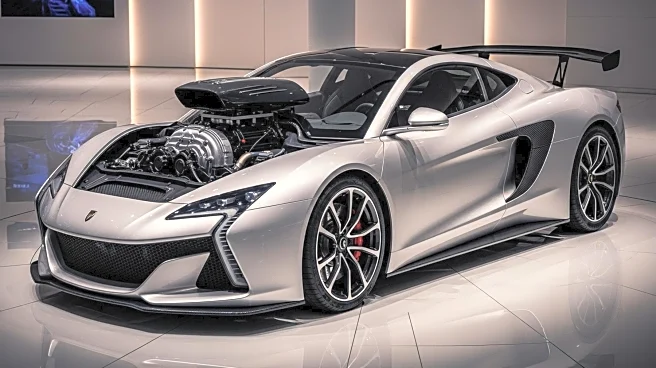What is the story about?
What's Happening?
Ferrari has introduced the 849 Testarossa, a plug-in hybrid sports car, marking a significant evolution in its lineup. The new model replaces the SF90 Stradale and features a hybrid powertrain that combines a 4-liter, eight-cylinder turbo engine with three electric motors, producing a total of 1,035 horsepower. This represents an increase of 50 horsepower over the SF90 Stradale. The Testarossa can operate in electric-only mode for approximately 15 miles, thanks to its 7.45kWh battery pack. The car boasts impressive acceleration, reaching 62 mph in under 2.3 seconds and achieving a top speed of 205 mph. The starting price for the coupe is €460,000 ($540,000), with deliveries beginning in Europe in 2026 and later in the U.S., where tariffs may affect pricing.
Why It's Important?
The introduction of the hybrid Testarossa signifies Ferrari's commitment to integrating advanced technology into its luxury sports cars, potentially setting a new standard in the industry. This move aligns with broader trends towards electrification in the automotive sector, as manufacturers seek to balance performance with environmental considerations. The Testarossa's hybrid capabilities may appeal to consumers looking for high-performance vehicles with reduced emissions. Additionally, Ferrari's strategy could influence other luxury carmakers to accelerate their own hybrid and electric vehicle development, impacting market dynamics and consumer expectations.
What's Next?
Ferrari plans to launch its first all-electric sports car in 2026, indicating a continued shift towards electrification. The hybrid Testarossa may serve as a precursor to this development, helping Ferrari gauge consumer interest in high-performance electric vehicles. The company will likely monitor market reception and adjust its strategy accordingly. U.S. customers can expect the Testarossa in late 2026, with potential price adjustments due to tariffs. Ferrari's future offerings will likely focus on enhancing electric range and performance, as well as expanding its hybrid lineup.















